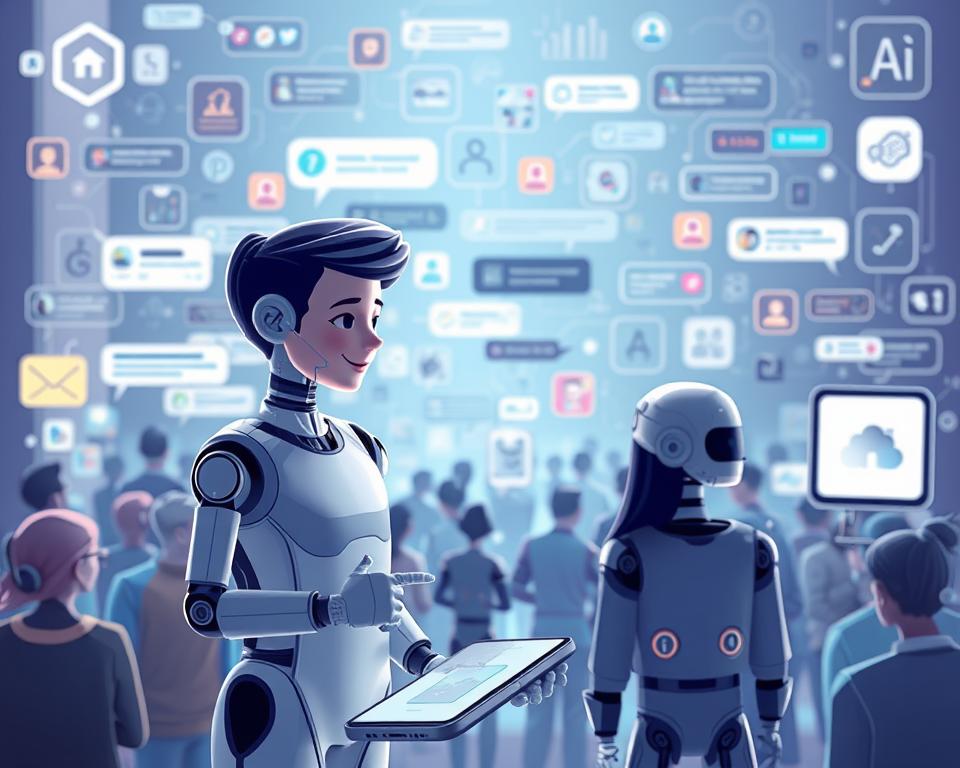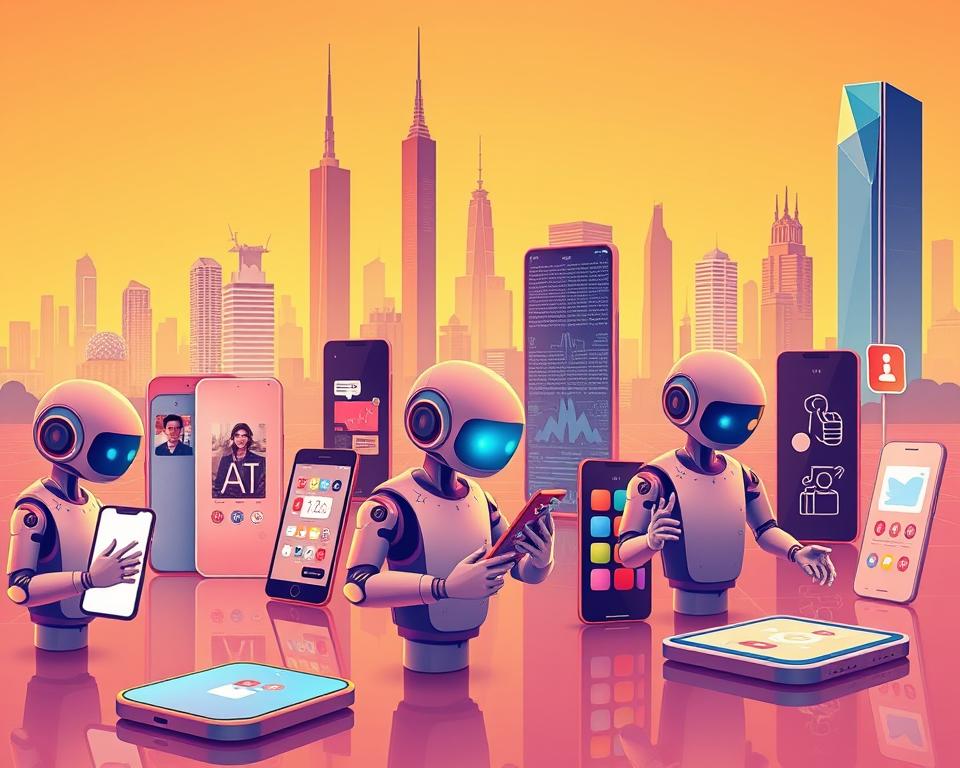The use of AI agents in mobile apps is changing how we use technology. These smart systems make complex tasks easier. They also make our interactions with apps more enjoyable and efficient.
Automation is now about making things easier and more personal. With AI agents in mobile apps, we’ll see big improvements. Expect better customer service and smarter predictions.
Table of Contents
Key Takeaways
- AI agents are making mobile apps more interactive and responsive.
- Automation in mobile apps is growing beyond simple tasks.
- Our experience with apps is getting more personalized and enjoyable.
- Future updates will likely include better predictive analytics and customer service.
- The addition of AI agents is set to change the mobile app world.
The Evolution of Mobile App Intelligence
The story of mobile app intelligence is one of slow but steady progress. It has turned simple apps into smart tools that can understand and change based on how users act.
From Basic Automation to Intelligent Agents
At first, mobile apps had basic automation. They followed set rules and simple scripts. These early apps could personalize a bit, but they were not very advanced.
Early Mobile Automation Features
Mobile automation started with simple tasks like setting schedules and managing notifications. These early features were basic and couldn’t learn from user actions.
The Transition to Learning Systems
Machine learning brought a big change. Mobile apps started to adjust to how users behave. This led to more tailored experiences for everyone.
Key Milestones in Mobile AI Development
Mobile AI has seen many important moments. These include new technologies and key apps that showed what mobile AI can do.
Breakthrough Technologies
New tech like natural language processing and computer vision have been key. They’ve made mobile AI smarter, allowing for better interactions between users and their devices.
Pivotal Mobile AI Applications
Virtual assistants have become very common. They show how AI can change how we use our phones. These apps have made interacting with smartphones much easier.
AI in mobile apps is still growing. It promises even smarter and more personal experiences in the future.
Understanding AI Agents: Definition and Core Concepts
AI agents are changing mobile apps from simple tools to smart helpers. They make apps work better on their own and understand what users need.
What Makes an AI Agent Different from Traditional Automation
AI agents are not like old automation systems. They can make choices and change how they act based on new info. This is different from old systems that just follow rules.
Autonomy and Decision-Making Capabilities
AI agents can do things on their own without being told. They make choices based on complex rules that look at what users like and do.
Learning and Adaptation Mechanisms
These agents get better over time thanks to learning tools like machine learning. They adjust to how users interact with them, making their responses more personal.
The Anatomy of an Effective Mobile AI Agent
A good mobile AI agent has several important parts that work well together.
Perception Components
Perception parts help AI agents understand what users say or type. They are key for the agent to answer user questions right.
Processing Engines
Processing engines are the AI agent’s thinking part. They look at data and make choices. These engines use smart algorithms and learning models to work fast.
Action Execution Systems
Action systems do what the processing engines decide. They talk to the user and the app. This makes sure the AI agent’s actions are useful in the app.
Knowing these key ideas and parts helps developers make better AI agents. These agents can make mobile apps more useful and fun for users.
AI Agents in Mobile Apps: The Next Generation of Automation
AI agents are changing how we use mobile apps. They make interactions more intuitive and personal. This change comes from new tech in artificial intelligence and machine learning.
How AI Agents Are Transforming Mobile Experiences
AI agents are making mobile app interactions smarter. They go from just reacting to what you do to actually anticipating your needs. This is thanks to better data analysis and pattern recognition.
From Reactive to Anticipatory Interactions
AI agents help apps guess what you might need next. They do this by analyzing data and patterns. This makes interactions more proactive and less reactive.
Continuous Learning from User Behavior
AI agents learn from how you use apps. They adapt to your likes and habits. This means apps get better at understanding you over time.
The Shift from Reactive to Proactive Mobile Applications
Mobile apps are becoming more proactive. This is because AI agents can understand context and behavior. This shift is a big change.
Context-Aware Notifications and Suggestions
AI agents make notifications and suggestions that fit your situation. They’re based on what you’re doing and what you like. This improves how you feel about using apps.
Automated Task Completion
AI agents can handle tasks for you in apps. This makes using apps easier and less work for you. It uses advanced tech to understand and act on your input.
With AI agents, mobile apps are getting smarter and more user-friendly. This is a big step forward in how we use mobile apps.
Key Technologies Powering AI Agents in Mobile Applications
Mobile AI agents use new technologies to get better. These technologies help make user experiences more natural and personal.
Natural Language Processing and Understanding
Natural Language Processing (NLP) is key for AI agents. It lets them understand and talk like humans, making interactions smoother.
Voice Recognition Advancements
Voice recognition has gotten better, making NLP more accurate. Now, AI agents can get what you say and respond right away.
Contextual Language Understanding
AI agents also get the context of what you say. This helps them give answers that are just right for you, making your experience more personal.
Computer Vision Capabilities
Computer Vision is another important tech for AI agents. It lets them see and understand what’s around them.
Object and Scene Recognition
AI agents can spot objects and scenes. This is super useful for things like augmented reality and finding images.
Augmented Reality Integration
Adding augmented reality (AR) to computer vision opens up new ways to interact and have fun.
Machine Learning Models Optimized for Mobile
Machine Learning (ML) is the core of AI agents. Making these models work well on mobile devices keeps them fast and efficient.
On-Device Neural Networks
Using on-device neural networks helps AI agents work faster and keeps your data safe by processing it locally.
Transfer Learning Approaches
Transfer learning lets AI models use what they already know to learn new things. This means they can get good at new tasks quickly.
Types of AI Agents Currently Deployed in Mobile Apps
AI agents in mobile apps have changed how we interact with them. They make our experience more personal and easy to use. These agents are used in many apps, changing how we use digital services.
Virtual Assistants and Chatbots
Virtual assistants and chatbots are common in mobile apps. They talk like humans, helping and supporting us.
General-Purpose Assistants
General-purpose assistants like Siri and Google Assistant can do many things. They set reminders and control smart devices. They’re getting smarter, allowing for more complex tasks.
Domain-Specific Conversational Agents
Domain-specific agents focus on specific areas, like customer service. They offer expert advice in their field.
Recommendation Engines
Recommendation engines are used in many apps. They suggest content, products, or services based on what we like.
Content Discovery Systems
Content discovery systems find new content for us. They’re found in streaming services and social media.
Product and Service Recommenders
In e-commerce apps, recommenders suggest products based on our history. They make shopping better, leading to more sales and happy customers.
Predictive Text and Input Systems
Predictive text systems make typing easier. They guess what we’re typing and correct mistakes. They also recognize gestures and handwriting.
Smart Keyboards and Autocomplete
Smart keyboards and autocomplete guess what we’re typing. This makes typing faster and more efficient.
Gesture and Handwriting Recognition
Gesture and handwriting recognition let us use our devices naturally. It makes our experience better.
Context-Aware Agents
Context-aware agents understand our surroundings and actions. They use this info to offer services that fit our needs.
Location-Based Services
Location-based services give us info based on where we are. They offer directions and special offers.
Activity and Behavior Recognition
These technologies recognize what we’re doing, like exercising. They give us personalized tips and insights.
Benefits of Implementing AI Agents in Mobile Applications
AI agents in mobile apps are changing how we use them. They make interactions smoother, workflows more efficient, and content more personal.
Enhanced User Experience and Engagement
AI agents make apps more natural and easy to use. This is thanks to:
Reduced Friction and Cognitive Load
AI makes complex tasks simpler. It reduces the mental effort needed, making apps more fun to use.
More Natural and Intuitive Interactions
AI lets apps understand and respond like humans. This boosts user happiness.
Operational Efficiency and Automation
AI agents automate routine tasks. This boosts efficiency in mobile apps. Key benefits include:
Streamlined Workflows
AI automates repetitive tasks. This makes workflows smoother, helping businesses work better.
Resource Optimization
AI optimizes how resources are used in apps. It ensures resources are used well.
Personalization at Scale
AI makes mobile apps more personal. This includes:
Individual User Adaptation
AI agents learn about users. They offer tailored suggestions and content.
Dynamic Content and Interface Customization
AI personalization changes content and interface on the fly. This boosts user interest.
Let’s compare traditional apps with AI-integrated ones:
| Feature | Traditional Mobile Apps | AI-Integrated Mobile Apps |
|---|---|---|
| User Interaction | Static and predictable | Dynamic and adaptive |
| Personalization | Limited to basic preferences | Advanced, AI-driven personalization |
| Operational Efficiency | Manual task management | Automated workflows and task management |
Challenges in Developing Effective Mobile AI Agents
Creating effective mobile AI agents is a tough task. Mobile apps are getting smarter, and AI agents are key to these advancements.
Device Limitations and Performance Constraints
Mobile devices face big challenges. They have limited power and battery life, affecting AI agent performance.
Battery Consumption Issues
AI agents need a lot of power, which eats into the battery. This can make the app slow and frustrating to use.
Processing Power Limitations
The power of mobile devices limits how complex AI can be. This affects how well AI agents work.
Privacy and Data Security Concerns
Privacy and data security are big worries. AI agents need personal data to work well, but this raises privacy issues.
Data Collection Requirements
AI agents need data to get better, but collecting it is tricky. It’s important to do this in a way that respects privacy.
Securing Sensitive Information
Keeping user data safe is a major challenge. Strong security measures are needed to keep users’ trust.
User Adoption and Trust Issues
Getting users to trust AI agents is hard. For AI to succeed, users need to feel safe and confident using it.
Overcoming Skepticism
Many people are wary of AI because of privacy and bias concerns. Being open and educating users can help build trust.
Building Transparent AI Systems
AI systems that explain their decisions can help users trust them more. This transparency is key to gaining user confidence.
On-Device vs. Cloud-Based AI Agents: Pros and Cons
AI agents in mobile apps can be on-device or cloud-based. Each has its own benefits and drawbacks. Knowing these differences helps developers improve app performance, privacy, and user experience.
The Trade-offs Between Performance and Privacy
On-device AI agents process data locally, which is good for privacy and speed. But, they might not work as well on older devices.
Latency Considerations
On-device processing is quicker because data doesn’t go to the cloud. This is great for apps that need fast responses.
Data Protection Approaches
Keeping data on the device helps protect privacy. But, it might not be enough for training AI models with lots of data.
Hybrid Approaches for Optimal Results
Using both on-device and cloud-based processing can be the best choice. It lets developers use the strengths of each method.
Distributed AI Processing
Distributing AI tasks between the device and cloud can improve performance. For example, simple tasks can be done on the device, while complex ones go to the cloud.
Adaptive Computation Shifting
Some systems can move tasks between the device and cloud based on network and device conditions. This makes the app work better for users.
For more on building AI personal assistants, check out Next Big Technology.
Industry-Specific Applications of AI Agents in Mobile Apps
AI agents in mobile apps are making things better for users and making work easier. They are changing how businesses work and talk to their customers.
Healthcare and Wellness
In healthcare, AI agents help improve patient care and make things run smoother.
Diagnostic and Monitoring Agents
AI can look at medical data to spot health problems early.
Personalized Health Coaching
Finance and Banking
The finance world uses AI agents to keep things safe, help customers, and make things run better.
Fraud Detection Systems
AI finds and stops fraud by looking at how money moves and spotting odd things.
Financial Advisory Agents
AI helps with money advice and managing your investments.
| Sector | AI Agent Application | Benefits |
|---|---|---|
| Healthcare | Diagnostic and Monitoring Agents | Early disease detection, improved patient care |
| Finance | Fraud Detection Systems | Enhanced security, reduced financial losses |
Retail and E-commerce
AI agents help make shopping better and increase sales in retail and online stores.
Shopping Assistants
AI shopping helpers find products, suggest things, and make buying easy.
Visual Search and Recognition
AI lets you search for things by taking pictures.
“The integration of AI agents in retail is revolutionizing the shopping experience, making it more personalized and efficient.”
Transportation and Navigation
In transportation, AI agents make getting around better, safer, and more efficient.
Intelligent Routing Systems
AI routing systems give traffic updates and find the best way to go.
Predictive Maintenance Alerts
AI predicts when vehicles need maintenance, cutting down on downtime.
AI agents in mobile apps have many uses across different fields, bringing big benefits.
Case Studies: Successful AI Agent Implementations
AI agents in mobile apps are shown to be effective through examples like Snapchat’s AR agents. These examples have improved user experience and set new standards for app intelligence.
Google Assistant and Its Mobile Integration
Google Assistant has changed how we use our mobile devices. It lets users interact with their devices in many ways, including voice, text, and gestures.
Multimodal Interaction Capabilities
Google Assistant can handle different types of input. This makes it a powerful tool for mobile users, offering a more natural way to interact with devices.
App Integration Ecosystem
The Assistant works well with many apps, making tasks easier. This has greatly improved user experience and productivity.
Siri’s Evolution as an AI Agent
Siri, Apple’s virtual assistant, has grown a lot since it started. It now does more than just take voice commands, becoming a key feature in Apple devices.
From Voice Commands to Proactive Intelligence
Siri now predicts what users need and gives them information before they ask. This change has made Siri much more than a simple command tool.
Privacy-Focused Design Approach
Apple has made sure Siri protects user data. This focus on privacy has helped keep users’ trust.
Snapchat’s AR and Visual Recognition Agents
Snapchat has used AI agents well, especially in its AR and visual recognition features. These features have made Snapchat a top choice for fun and interactive social media.
Real-Time Facial Recognition Filters
Snapchat’s facial recognition filters have been a hit. These AI-powered filters add fun and interaction to the app.
Object and Scene Understanding
The app can recognize objects and scenes, enabling advanced AR experiences. This has opened up new ways for users to be creative and interact.
| AI Agent | Key Features | Impact |
|---|---|---|
| Google Assistant | Multimodal interaction, App integration | Enhanced user experience, Productivity |
| Siri | Proactive intelligence, Privacy-focused | User trust, Anticipatory capabilities |
| Snapchat’s AR Agents | Real-time facial recognition, Object and scene understanding | Interactive experiences, Creative expression |
The Impact of AI Agents on Mobile App Development
AI agents are changing mobile app development. They are making apps smarter and more user-friendly. This change is also updating how apps are made and the skills needed for developers.
Changing Development Paradigms
The old way of making apps is being replaced by a new approach. This agent-driven design focuses on apps that learn and help users on their own.
From Feature-Driven to Agent-Driven Design
Agent-driven design is a big change from the old method. It’s about making apps with AI that can do things by themselves. This makes apps easier to use.
Continuous Learning and Improvement Cycles
AI agents help apps get better over time. They learn from how users interact with them. This means apps always stay useful and up-to-date.
New Skills Required for Modern Mobile Developers
Developers need new skills because of AI agents. They must know about machine learning and data science and analytics.
Machine Learning Fundamentals
Understanding machine learning is key for AI agents. Developers must design and use machine learning models for mobile apps. For more on AI in mobile app development, check out Solulab’s article.
Data Science and Analytics
Being able to use user data is important for AI agents. Developers need to know data science and analytics. This helps them make AI agents that really understand users.
Ethical Considerations and Responsible AI Agent Design
AI agents are changing how we use mobile apps. It’s key to focus on ethics in their making. As AI spreads, we need transparent and fair designs.
Transparency and Explainability
Transparency means users can understand how AI works. This can be done by:
- Clear explanations of AI’s decision-making
- Telling users what AI can and can’t do
Making AI Decisions Understandable
Developers should aim to make AI’s choices clear. For more on this, check out Responsible AI practices.
Communicating Capabilities and Limitations
It’s important to tell users what AI can and can’t do. This helps manage their expectations.
Avoiding Bias and Ensuring Fairness
AI fairness needs careful data use. This means:
- Training AI with diverse data to avoid biases
- Testing AI for fair results for all users
Diverse Training Data Requirements
Diverse data is key to avoiding AI biases. For more on AI development, see Key Essentials of AI Development.
Testing for Equitable Outcomes
Testing AI regularly for fairness is important. This checks if AI works well for all users.
User Control and Consent
Users should have control over AI and know how data is used. This can be done by:
- Letting users adjust AI settings
- Having clear data policies that are easy to find
Configurable AI Behavior
Users can customize AI to fit their needs. This gives them more control.
Clear Data Usage Policies
Clear data policies build trust. They tell users how their data is used.
The Future of AI Agents in Mobile Computing
AI agents in mobile apps are on the verge of a big change. New trends and technologies are coming. These changes will change how we use our mobile devices.
Emerging Trends and Technologies
The world of AI agents in mobile computing is changing fast. New trends and technologies are leading the way. These include federated learning and emotional intelligence in AI agents.
Federated Learning Approaches
Federated learning lets AI models learn from data on many devices. This keeps data safe and reduces the need to send it to big servers. It’s great for mobile devices, where keeping data safe is important.
Emotional Intelligence in AI Agents
Adding emotional intelligence to AI agents makes them understand and respond to feelings better. This makes interactions more personal and empathetic. It will make users happier and more engaged.
The Role of 5G and Edge Computing
5G and edge computing will change AI agents in mobile computing a lot. These technologies make AI faster and more efficient. They make it possible for AI to work in real-time.
Reduced Latency Benefits
5G makes AI faster by reducing delays. This is key for apps that need to work quickly, like augmented reality and voice assistants.
Distributed AI Processing
Edge computing lets AI work closer to users. This makes AI agents work better and faster. It’s a big step for mobile computing.
| Technology | Benefits | Impact on AI Agents |
|---|---|---|
| 5G | Reduced Latency | Faster Interactions |
| Edge Computing | Distributed Processing | Enhanced Performance |
| Federated Learning | Improved Privacy | Secure AI Training |
Multimodal AI Agents
The future of AI agents in mobile computing includes new abilities. They will use vision, voice, and sensors to offer better experiences.
Combining Vision, Voice, and Sensor Data
AI agents will use different types of data to serve users better. For example, they can recognize objects with cameras and give helpful info.
Cross-Device Agent Ecosystems
AI agents will soon work across different devices. This will give users a smooth experience no matter the device. For more on using AI in mobile apps, check out Next Big Technology.
How Businesses Can Prepare for the AI Agent Revolution
AI agents are changing the mobile app world. Businesses must get ready for this change. They need a solid plan to add AI agents to their apps.
Strategic Planning for AI Integration
Planning well is key for AI success. Companies should:
- Identify High-Value Agent Opportunities: Look at how users act to find where AI can help a lot.
- Build AI Roadmaps: Make a clear plan for AI development and use, matching business goals.
Building the Right Technical Infrastructure
A strong tech base is vital for AI work. Important points include:
- Data Collection and Management Systems: Set up good systems for data to help AI learn and work. Learn more at Next Big Technology.
- AI Development Platforms: Pick the best tools and platforms for AI work.
Training and Workforce Considerations
AI success needs a trained team. This means:
- Upskilling Development Teams: Give teams the chance to learn and grow in AI.
- Collaboration Between AI Experts and Domain Specialists: Work together to make sure AI is used right.
User Perspectives: How AI Agents Are Changing Mobile Behaviors
AI agents in mobile apps are changing how we use our devices. As AI gets better, apps are becoming smarter and more personal. This is changing how we behave and what we expect from our apps.
Shifting Expectations and Interactions
AI agents in mobile apps are changing how we interact with them.
Now, users expect apps to know them better and act on their behalf. This new normal of AI assistance includes things like smart text suggestions and personalized tips.
The New Normal of AI Assistance
AI help is now the standard, with users counting on AI for tasks and advice. This need for AI is pushing apps to get even smarter.
Changing Digital Literacy Requirements
As AI agents become more common, we need to learn new skills to use them well. This includes knowing how to talk to AI, understand its answers, and manage its features.
The Growing Reliance on AI-Powered Features
More and more, people are using AI features in their apps.
Features like virtual assistants and recommendation engines are making life easier. This is shown in how often people use these AI tools.
Usage Patterns and Adoption Rates
| Feature | Adoption Rate | User Satisfaction |
|---|---|---|
| Virtual Assistants | 75% | 85% |
| Recommendation Engines | 60% | 80% |
| Predictive Text | 80% | 90% |
User Satisfaction and Feedback Trends
People are happy with AI features, wanting more that understand them better. A study found users like apps that use AI, as talked about in this article on how artificial intelligence is revolutionizing mobile apps.
Conclusion: Embracing the AI-Powered Mobile Future
AI agents in mobile apps are changing how we use our devices. They make our experiences more personal, easy to use, and efficient. This article has shown how AI agents are making mobile computing better by making apps more proactive, engaging, and streamlined.
The future of mobile tech is all about AI. AI agents will get smarter with better natural language, computer vision, and machine learning. Businesses need to get ready by adding AI to their mobile plans. For more on using AI and machine learning in apps, check out Next Big Technology.
As AI agents become more common, people will want smarter, quicker, and more tailored interactions from their phones. By embracing this AI-powered future, developers and companies can open up new chances, spark innovation, and give users amazing experiences.



















